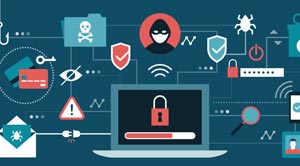The Importance and Scope of Cyber Security
Cybersecurity is a need and not a want today. The current digital landscape experiences several cybercrimes, and this has widened the usability of cybersecurity across various industries.
FREMONT, CA: The dominance of the Internet has given us a clasp over the world. But given the enormous use of the Internet, connected devices, and cloud-based platforms, we have invited more number of cybersecurity threats. The soaring number of cybercrimes has alarmed the organizations to plan and appropriately invest in cybercrime management models.
The importance of cybersecurity today
According to Cybersecurity Ventures every 14 seconds, witness a cybercrime somewhere or the other, on the globe. With this intensity of breaches, studies infer that cybercrime losses will be worth more than $6 trillion in the next two years. These forecasts highlight the significance of cybersecurity at this hour.
An efficient cybersecurity module offers protection in different layers across computers, networks, and programs. Every element in the module, including the people, must ensure integrity among them to achieve a secure cyber environment. It is important to note that not only the giant corporations fall in the trap of cyber breaches, but the smaller companies and individuals are also affected by severe hacking and data compromises. At this hour, therefore, companies handling colossal sensitive data and information, it is wise to incorporate cybersecurity for maintaining the safe cyber regime.
Perks of Cyber Security
Espionage, fraudulent, and others, scar the cyber environment of an organization. Under such conditions, it is essential to enhance the Cyber Security framework. A genuine Cyber Security Framework ensures;
Protection against unauthorized access,
Adequate security measures without hindering the organization's credentials,
Preventing any anticipated cyberattack and devices responsive and recovery tools,
Enhanced business continuity, and
Effective security centralization for stakeholders.
Scope of Cyber Security across multiple domains
The fabrication of cybersecurity has become highly advanced in terms of its capability to resolve issues across different sectors. They consist of many defensive layers that enable them to generate hindrances in the way of the attackers. Let us take a look at the domains where organizations deploy cybersecurity.
Security Management
This field involves risk assessment, adjusting security functions to abide by operational compliance, modifying management processes, and sensify users so that they are aware.
Identity and Access Management (IAM)
IAM deals with designating the user-identity, authentication, and controlling the access. Identity and authentication procedures function simultaneously where identity processes define unique user-identity and their systems while authentication procedures monitor the access of authorized users.
Security Engineering
Both network security and computer operation security constitute security engineering. It looks into the aspects of intrusion detection, unwanted intrusion prevention, firewalls, vulnerability and virus scanning, antiviruses, and prevention of data losses.
Business continuity
It is this unit that acts as the recovery tool for disaster struck businesses. Business continuity analyzes the central system of functioning of the organization and offers processes to ensure proper running of these functions with minimum data loss.
Compliance
The primary responsibility of this domain is to inspect the security measures and their compliance with the organization's regulations.
Cryptography
Organizations often use Cryptography for safeguarding data integrity, authenticity, and confidentiality.
Physical security
Physical security mostly pertains to the physical hardware and its related workflow, which generally affects the cyber environment in case of a cyber attack. The domain oversees the protection of the data centers, installation of HVAC, fencing of facilities, and other processes.
Software Development Security (SDS)
SDS is responsible for managing system or application issues. It arranges for security training sessions for the developers, analyzes coding-decoding modules, and examines the requirement for additional features of an application and its effect on cybersecurity.
Security operations
Security Operations Center monitors the cybersecurity tools, their efficaciousness, and compliance with the organizational legislation. These operations deal with threat hunting, incident response, and forensics.
The Future of Cybersecurity
Recent studies report that the number of Internet users will grow by three times in 2020 and reach about 7.5 billion by the end of this decade. This rising number of users hints at regularizing cybersecurity more and making it a mandatory regime within every organization. Artificial Intelligence can be an efficient tool for detecting some vulnerabilities and alert people regarding risky websites or incompetent security actions.
Researchers also believe that the upcoming years can witness cyber warfare. Therefore, organizations will need to establish reliable and secure cyberspace.
Today, the number of hacks has also increased significantly with the increased number of sophisticated cybercriminals. However, there exists a severe problem of bridging the gap in the requirement for sound cybersecurity experts.
Therefore, it is an urgent need of the organizations to deploy an adequate security and compliance system. It is vital to ensure proper management of cybersecurity to keep up to the changing trends of the cyberattacks and consequently develop a safe digital space for all.
See Also: Top Identity and Access Management Solution Companies
See Also: Top Information Security Companies









Gloss